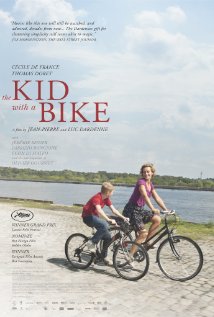
Enter De France (who was also wonderful in the under-appreciated Clint Eastwood film, Hereafter). She takes pity on the kid and brings him his bike and even agrees to take him on weekends.
But she quickly finds out the bike is not the issue.
The film is a "slice of life" affair. I initially thought John Cassavetes but that is not really accurate and is more of a knee-jerk for any film that depicts real life on a small scale. This film lacks the figurative claustrophobia of a Cassavetes film. It isn't suffocating, there is an openness to it. There is also more hope in this film and less desperation.
This is what makes it real. While you watch you are annoyed by him but if, afterward, you take the time to think about it his reaction isn't anything out of line. Imagine your father abandoning you and--at length--telling you he doesn't want you around. Imagine all the justifications for his actions you would make. Imagine how you would try to find acceptance elsewhere. This is what rings true about the movie--the kid.
De France's character is missing something, however. We have no backstory. We do not know why she, out of the blue, takes on this child. Maybe she is just a generous person but aside from the kid we never see her in any context that shows this. She seems to be a little cold toward the man in her life (whose character is not particularly well defined). It isn't a big problem but it nags a bit and it could have been solved by showing one act of disconnected kindness by her character.
Perhaps the idea is to show the connection she has to the boy--that unlike his "real" parent she will do anything for him. Maybe she is supposed to be a symbol of what a real parent SHOULD be. In that case? My arguments are moot (and a little silly).
The film is worth a visit to the theater--or grab it on DVD since it is likely not going to be around the cinemas much longer. There is no one wearing tights in it.


 RSS Feed
RSS Feed